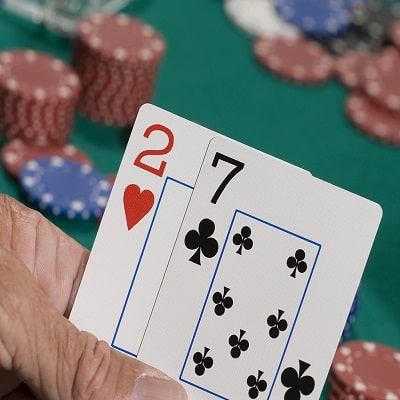
Types of Poker
No matter what type of poker you play, its main components are luck and cold mathematical calculation.
Texas Hold’em
Recommended for beginners due to its simple rules:
- Two participants, to the left of the dealer’s button, make mandatory bets. The button is moved after each hand.
- Two face-up cards are dealt.
- The first betting round is opened by the contestant behind the big blind position.
- Three Community Cards (the flop) and a new betting round is opened for the player in the IB position or to his left.
- After the betting equation the fourth common card (the turn) opens with the above principles of betting.
- After another betting equation the last community card (river) is dealt. The rules of dealing are the same.
If there is more than one person left in the game, there is a hand strength comparison.
Holdem 6+
Differs from the classical version by using a shortened deck, which leads to a change of seniority of combinations.
Omaha
Trading rules are identical to Hold’em. Two of the four (five) cards received in a hand are used to form combinations.
Three common cards are involved when forming a hand.
With each new Hand the Table changes.
Omaha high-low
This variation differs from the classic by dividing the pot in two: the first part goes to the player with the strongest hand, the other part goes to the player with the low (the worst combo possible).

Stack
There is no Flop, Turn and River in either the Five or Seven Card Stud. The game starts with a mandatory bet (ante). After dealt two hole cards and one open card, the player with the lowest value makes a king-in. In case of a tie, the strength is determined by suit. After the first bidding the players receive one open card each. The player with the strongest open hand has the floor. Then another open card is dealt and a similar trade. A repeat of the situation. Then, the players each receive their last card dealt and trade as before until showdown.
Razz
A subspecies of herd – lowball (with the worst combination winning). Features of the game: The weakest card is an Ace, Flush and Straight do not count, and the strongest hand is a “wheel” (A-2-3-4-5).
Draw Poker
An aggressive game with an exchange and two types of mandatory bets:
- Players to the left of the dealer place a Small and Large Blind. A Hand is opened by the player to the left of the BB, subsequent rounds are opened by player on the left side of the BB.
- Antes are collected from all participants of the deal. Bidding begins with the player to the left of the dealer.
After the five closed cards are dealt, it’s possible to make one or three exchanges.
Lowball
Instead of a flush-royal, players try to make the weakest combination. Subtypes of lowball:
- Ace to five. The strongest combination is
- “wheel” A-2-3-4-5. Without taking into account the suits and the order.
- From a deuce to a seven. The strongest combination is
- is a hand of 2-3-4-5-7. Including suits and order.
Badugi
Involves assembling a different four-card hand (A-2-3-4 is the best), without repeating suits or values.
After 4 closed “pockets” are dealt, there are three rounds of exchange. If no one has a baduga hand, only cards without a repeat count.
H.O.R.S.E.
A certain amalgamation of five separate games – Texas Hold’em, Omaha Low/Omaha High, Razz, Seven Card Stud and Seven Card Stud from Eight. Each hand signals a change in the game.
Chinese Poker
This has the characteristics of solitaire: participants (from 2 to 4) receive 13 cards and place them on the board in three rows – in the first and second rows of 5 cards and in the third row of 3 cards. Combinations are formed in ascending order of strength – from the front line to the back.
There are no mandatory bets; “lumps” are placed at an agreed value.
Poker versus casino
Playing with a dealer is not for earning, but for pleasure or sharpening your skills.

